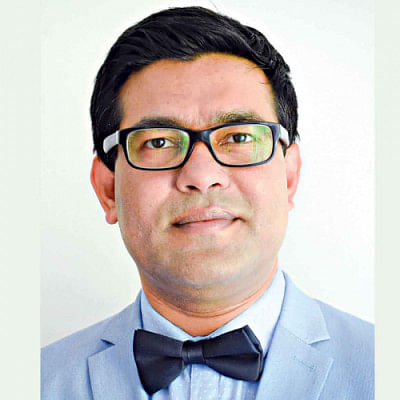Surveillance data key to fighting Covid

With no sign of Covid-19 going away any time soon, accurate and sufficient surveillance data is more important than ever to help inform public health policy in fighting the pandemic, said Dr Nazrul Islam, member of the UN-WHO Technical Advisory Group on Covid-19 Mortality Assessment.
While one year has passed since the Covid-19 outbreak in the country, Bangladesh is still lagging behind in producing well-organised research-quality scientific data, he said in a recent interview with The Daily Star.
"Covid-19 is not going away any time soon. So, it is very important that we devise our public health policy based on rigorous scientific evidence. And it is only possible when we have accurate and sufficient research-quality surveillance data available to the scientific community," Nazrul, also a physician-epidemiologist at the University of Oxford, told The Daily Star.
The joint advisory group has been formed in the context of the collaboration between the World Health Organisation (WHO) and the United Nations Department of Economic and Social Affairs (UN DESA).
The group's primary role will be to advise and support efforts to assist WHO and UN member states to obtain accurate estimates of the number of deaths attributable to the direct and indirect impacts of the pandemic.
Nazrul Islam is the only Bangladeshi among the 31 members of the advisory group.
In line with the broader objective of the group, Nazrul and two other members from the advisory group have been analysing all reported deaths since 2016 from 29 countries across the globe.
"We have selected those countries because they have accurate and robust data on vital statistics. Using a newly developed model, we will analyse the trends and patterns of deaths over the past few years, and will compare with the deaths during the Covid-19 pandemic," he said.
In this way, the team aims to assess the deaths that were, directly or indirectly, caused by the Covid-19 pandemic.
He informed The Daily Star that Bangladesh was not among the 29 countries under their study.
"Our statistical model requires detailed weekly mortality data by age and sex. For an accurate examination of the historical trend of mortality, we also need detailed data for the last few years. To my knowledge, such data is not yet available from Bangladesh," Nazrul said.
According to Nazrul, more detailed data is also required to have a proper understanding of viral transmission.
"For example, test positivity rate could be very misleading in measuring the level of transmission. It depends on how accurate the diagnostic test is. But more importantly, it depends on the population who are being tested for Covid-19. If we test 1,000 frontline workers, we may see a higher test positivity rate compared to the positivity rate of another 1,000 people who are safely working from home," he said.
Lauding the countrywide vaccination programme in Bangladesh, he also warned that the vaccine alone will not be enough to control the pandemic.
"I am not yet eligible for a Covid-19 vaccine here in the UK. Bangladesh has done an extraordinary job in the Covid-19 vaccine rollout. However, since the Covid-19 vaccine does not offer immediate protection against the disease, we need to continue to adhere to other protective measures such as personal hygiene, wearing masks properly, and maintaining physical distancing."
He, however, stressed on kindness and compassion for everyone at this critical time.
"I am inside my house for the last one year -- maintaining physical distancing and other health safety guidelines. I understand it can be challenging for many. But this is for the greater good of everyone. It is our shared responsibility to keep each other safe," Nazrul Islam concluded.
In the context of the recent surge of Covid-19 in Bangladesh, he said, there are many things to do in terms of a public health campaign.
"Several issues are very important simultaneously -- ensure vaccine rollout, reaching out to the people to be serious about Covid-19, and proper surveillance. It you ask me, I would invest more in a public health campaign and surveillance," Nazrul Islam said.
Nazrul received his Master's and PhD degrees in epidemiology and biostatistics at Harvard University and the University of British Columbia respectively following his medical training as a general practitioner.
He then moved to the University of Cambridge as a quantitative research associate to work on randomised clinical trials and large observational studies on cardio-metabolic disorders.
Much of his recent research has been dedicated to a better understanding of Covid-19.
His current work at the University of Oxford involves a combination of research methodology, medical statistics, and machine learning to examine cardiovascular disease burden using integrated electronic health records and large prospective health studies.
He is also a research editor at the British Medical Journal.

 For all latest news, follow The Daily Star's Google News channel.
For all latest news, follow The Daily Star's Google News channel. 



Comments